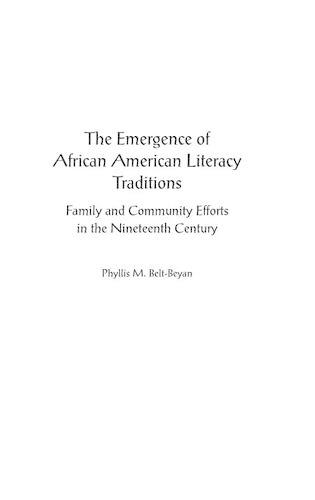
The Emergence of African American Literacy Traditions: Family and Community Efforts in the Nineteenth Century
(Hardback)
Publishing Details
The Emergence of African American Literacy Traditions: Family and Community Efforts in the Nineteenth Century
By (Author) Phyllis M. Belt-Beyan
Bloomsbury Publishing PLC
Praeger Publishers Inc
30th October 2004
United States
Classifications
Professional and Scholarly
Non Fiction
302.224408996073
Physical Properties
Hardback
224
Description
The ways in which the African American community learned to be proficient readers and writers during the 19th century were diverse, however, the greatest impact on literacy acquisition came from family and community efforts. African American arts, churches, benevolent societies, newspapers, literacy societies, and formal and informal schools supported literacy growth, and literacy growth in turn gave rise to national and international African American literacy traditions. The underlying motivations that gave shape to the nature of their literacy behaviors and events within family and community contexts and within national and global context are examined in detail here. The beginnings of African American literacy traditions would have failed had there not been intrinsic motivations, opportunities, and a need to use all of the language arts, reading, writing, speaking, listening, and viewing to maintain and protect what mattered most to them as a people. The institutionalization of these traditions into family and community rituals, including songs, prayers, letters, story telling, and the like gave a visibility to the African American in ways no other cultural knowledge could. Belt-Beyan traces the development of these literacy traditions, noting the parallel progression and transformation of Africans into African Americans, slaves into freepersons, and noncitizens into citizens.
Reviews
"Belt-Beyan's book, which explores family and community literacy among African Americans in 19th century United States, provides an interesting glimpse into the foundations of African American literacy traditions. She argues, and rightly so, that such traditions are best understood within contexts of what people did; why; and who they were as literate individuals, family members, members of their own communities, and members of wider American communities. She shows that African American literacy traditions emerged not only as individual developments, but also as group developments that were fully integrated in family and community ways of life.... This work will be important to researchers and graduate students interested in qualitative studies of families and communities from historical, cultural, and social distances."-Nancy Padak, Distinguished Professor, Education Kent State University
[T]races the development of literacy in the African American community during the nineteenth century. Particular attention is paid to the role of the family and community in the establishment of literacy traditions and their transmission to successive generations.-Reference & Research Book News
"Traces the development of literacy in the African American community during the nineteenth century. Particular attention is paid to the role of the family and community in the establishment of literacy traditions and their transmission to successive generations."-Reference & Research Book News
"[T]races the development of literacy in the African American community during the nineteenth century. Particular attention is paid to the role of the family and community in the establishment of literacy traditions and their transmission to successive generations."-Reference & Research Book News
Author Bio
PHYLLIS M. BELT-BEYAN is Assistant Professor of Literacy Research and Education at Western Michigan University.
